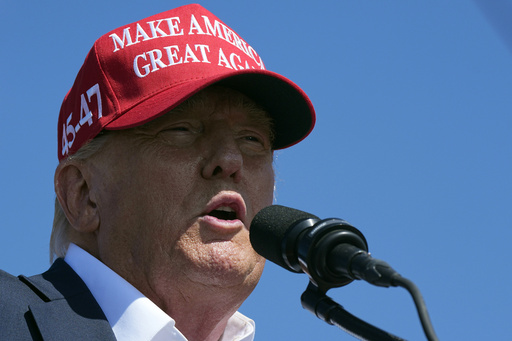WASHINGTON (AP) — In an unsparing dissent, Justice Sonia Sotomayor said the Supreme Court allowed a president to become a “king above the law” in its ruling that limited the scope of criminal charges against former President Donald Trump for his role in the Jan. 6, 2021 riot at the U.S. Capitol and efforts to overturn the election.
She called the decision, which likely ended the prospect of a trial for Trump before the November election, “utterly indefensible.”
“The court effectively creates a law-free zone around the president, upsetting the status quo that has existed since the founding,” she wrote. She was joined by liberal justices Elena Kagan and Ketanji Brown Jackson, who wrote another dissent referring to the ruling’s consequences as a “five alarm fire.”
Sotomayor read her dissent aloud in the courtroom, with a weighty delivery that underscored her criticism of the majority. She strongly pronounced each word, pausing at certain moments and gritting her teeth at others.
“Ironic isn’t it? The man in charge of enforcing laws can now just break them,” Sotomayor said.
Chief Justice John Roberts accused the liberal justices of fearmongering in the 6-3 majority opinion. It found that presidents aren’t above the law but must be entitled to presumptive immunity to allow them to forcefully exercise the office’s far-reaching powers and avoid a vicious cycle of politically motivated prosecutions.
While the opinion allows for the possibility of prosecutions for private acts, Sotomayor said it “deprives these prosecutions of any teeth” by excluding any evidence that related to official acts where the president is immune.
“This majority’s project will have disastrous consequences for the presidency and for our democracy,” she said. She ended by saying, “With fear for our democracy, I dissent.”
Trump, for his part, has denied doing anything wrong and has said this prosecution and three others are politically motivated to try to keep him from returning to the White House.
The other justices looked on in silence and largely remained still as Sotomayor spoke, with Justice Samuel Alito shuffling through papers and appearing to study them.
Sotomayor pointed to historical evidence, from the founding fathers to Watergate, that presidents could potentially face prosecution. She took a jab at the conservative majority that has made the nation’s history a guiding principle on issues like guns and abortion. “Interesting, history matters, right?”
Then she looked at the courtroom audience and concluded, “Except here.”
The majority feared that the threat of potential prosecution could constrain a president or create a “cycle of factional strife,” that the founders intended to avoid.
Sotomayor, on the other handed, pointed out that presidents have access to extensive legal advice about their actions and that criminal cases typically face high bars in court to proceed.
“It is a far greater danger if the president feels empowered to violate federal criminal law, buoyed by the knowledge of future immunity,” she said. “I am deeply troubled by the idea … that our nation loses something valuable when the president is forced to operate within the confines of federal criminal law.”
___
Associated Press writer Stephen Groves contributed to this story.
—
Rephrased content:
In a dissenting opinion, Justice Sonia Sotomayor criticized the Supreme Court’s ruling that restricted the scope of criminal charges against former President Donald Trump for his involvement in the January 6, 2021 Capitol riot and attempts to overturn the election, suggesting it granted the president unchecked power. Sotomayor, joined by Justices Elena Kagan and Ketanji Brown Jackson, expressed strong disapproval of the decision, which likely ended the possibility of a trial for Trump ahead of the upcoming election. She emphasized that the ruling created a law-free zone around the president, an unprecedented departure from established norms.
During the proceedings, Sotomayor delivered her dissent with force, highlighting the potential consequences of the majority’s ruling. She emphasized the dangers of allowing a president to act above the law, arguing that it could undermine democracy and the principles upon which the nation was founded.
Chief Justice John Roberts, part of the 6-3 majority, accused the liberal justices of spreading fear with their dissent. The majority opinion maintained that while presidents are not exempt from the law, they must have some degree of immunity to avoid politically motivated prosecutions that could hinder the execution of their duties.
Despite the possibility of prosecutions for private actions, Sotomayor criticized the majority for rendering such prosecutions toothless by excluding evidence related to official acts protected by presidential immunity.
Trump has consistently denied any wrongdoing, attributing the multiple prosecutions against him to political motives aimed at obstructing his potential return to office. The courtroom remained silent as Sotomayor disclosed historical evidence suggesting that presidents could face prosecution, a notion contested by the majority whose primary concern was the potential encumbrance on a president’s actions due to the fear of prosecution.
Sotomayor underscored that presidents have access to legal guidance and that legal proceedings against them typically face significant hurdles, suggesting that granting immunity might embolden future violations of federal law. The differing perspectives highlighted a fundamental disagreement over the balance between presidential power and accountability within the justice system.
Overall, the Supreme Court ruling and the dissenting opinions present a stark division on the limits of presidential immunity and accountability, raising important questions about the intersection of power, law, and democracy in the United States.
